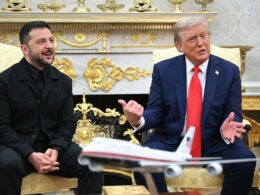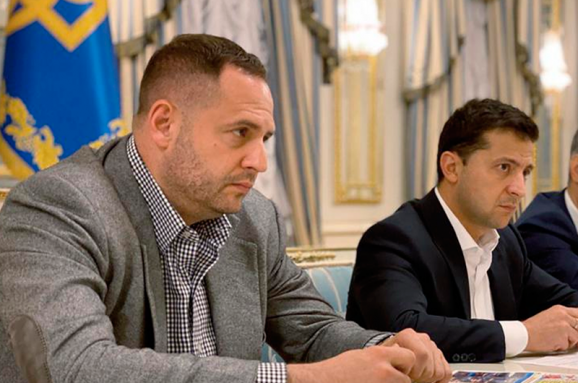US President Trump's special envoy Steve Witkoff held a more than four-hour meeting with Russian President Vladimir Putin in Russia's St. Petersburg on 11 April, as tensions rise over the administration's approach to Ukraine peace negotiations.
Sources told Reuters that less than 48 hours after dining with Russian negotiator Kirill Dmitriev in Washington, Witkoff suggested to President Donald Trump that the quickest way to secure a ceasefire in Ukraine would be to support Russia's claim to four eastern Ukrainian regions it tried to annex illegally in 2022, despite not fully controlling any of them. Reuters refers to two US officials and five people familiar with the situation.
During the White House meeting, General Keith Kellogg, Trump's Ukraine envoy, reportedly pushed back against Witkoff, arguing that Ukraine would never agree to unilaterally cede total ownership of these territories.
Repeating a number of Russian propaganda narratives, Witkoff had previously floated the same strategy during a March interview with Tucker Carlson, which sparked controversy both within the US administration and among allies. At the same time, Witkoff was unable to name the four regions - Donetsk, Luhansk, Zaporizhzhia, and Kherson - during his interview.
"They're Russian-speaking.There have been referendums where the overwhelming majority of the people have indicated that they want to be under Russian rule," Witkoff repeated Russian false narratives about Ukraine's eastern regions.
Western governments have consistently called the hastily organized referendum votes a sham and pledged not to recognize their results.
Some US Republicans have voiced serious concerns about Witkoff's apparent pro-Russia stance. After his Carlson interview, several called National Security Adviser Mike Waltz and Secretary of State Marco Rubio to complain, sources told Reuters.
European allies express concerns as they pledge support
As Witkoff met with Putin on 11 April, Ukraine's European allies gathered in Brussels for the Ukraine military backers meeting of the Ukraine Defense Contact Group (UDCG), or Ramstein Group. They emphasized that peace remains elusive due to ongoing Russian aggression.
Defense representatives from over 50 countries meet in Brussels to discuss Ukraine’s aid as Healey calls 2025 “critical” for Kyiv
"Given Russia's ongoing aggression against Ukraine, we must concede peace in Ukraine appears to be out of reach in the immediate future," German Defense Minister Boris Pistorius said during a news conference after the UDCG meeting, according to CNN.
British Defense Secretary John Healey noted:
"Today is one month to the day in which Russia rejected President Trump's peace settlement. Putin said he wanted peace, but he rejected a full ceasefire. Putin said he wanted peace, but he continues to drag his feet and delay negotiations. Putin said he wanted peace, but his forces continue to fire on Ukraine, military and civilian targets alike."
The meeting resulted in new pledges of military aid totaling more than $23.8 billion, which Healey called "a record boost in military funding for Ukraine."
Trending Now
UK, Norway unveil $580 million joint drone funding package
Trump grows impatient as talks stall
On 11 April, Trump expressed his impatience regarding the stalled ceasefire talks on Truth Social:
"Russia has to get moving. Too many people (are) DYING, thousands a week, in a terrible and senseless war - A war that should have never happened, and wouldn't have happened, if I were President!!!"
Ukrainian officials recently sent Washington a list of targets they believe Russia has struck in violation of the energy infrastructure ceasefire agreed to last month, according to sources familiar with the list, Reuters reported.
Trump administration lacks a clear plan, diplomats say
Western diplomats have expressed concern about the Trump administration's approach. Two senior Western diplomats told Reuters they believe Washington lacks a "clear plan" on how to move forward, according to Reuters.
"We sometimes hear contradictory things from different parts of the administration," one diplomat said. "That also adds to the sense that there is no real plan here."
Meanwhile, Ukraine's President Volodymyr Zelenskyy warned that the past month had made it "completely clear" that "Russia is the sole cause of this war." He emphasized that "without strength against Russia, there will be no will in Russia to accept and implement any realistic and effective proposals for peace."
Read also
-
Latvian defense minister: Europe “can do a lot” with its 2 million soldiers for Ukraine peacekeeping
-
Kremlin says “no plans” for Putin-Trump call as White House warns patience is limited
-
Rubio acknowledges that Russians violates ceasefire and says that negotiations will not last forever
-
Putin envoy Dmitriev, Trump envoy Witkoff met in Washington





